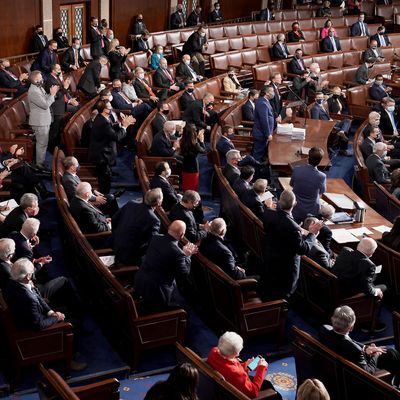
The House Select Committee investigating the events of January 6 has made it clear to the public how relentlessly Donald Trump and his cronies tried to exploit ambiguities in the Electoral Count Act of 1887 as part of their effort to keep Trump in power. The glaring problems with the law have been clear to close observers for some time, which is why a bipartisan group of senators has been quietly working on legislative fixes to prevent another disaster like the one in 2021. That “gang” of 16 senators released a draft legislative proposal last week. There are quibbles reasonable people might have this or that provision, but it’s the best we are likely to get out of a Republican Party terrified of thunderbolts from Mar-a-Lago. It would be prudent for Congress to listen to good-faith suggestions about the final form of an ECA reform bill, and then quietly sneak it up to Joe Biden before God knows what happens to Congress in November.
That hasn’t changed in the last six days. But now, unfortunately, there are signs the House committee may insist on its own ECA fix put together with other potentially dicey legislation, according to Politico:
The Senate’s latest bipartisan project — reform of a 135-year-old election law Donald Trump tried to exploit on Jan. 6 — is landing with a thud in the House.
Pivotal members of the Jan. 6 select committee are unimpressed by the proposal recently released by 16 senators in both parties to update the Electoral Count Act, the arcane statute Trump and his allies sought to manipulate to block certification of the 2020 election. And House members are signaling they want to go further.
Rep. Jamie Raskin (D-Md.) called the Senate effort “fine and necessary, but not remotely sufficient to meet the magnitude of the threat against democracy now,” citing the need to also push for voting rights changes.
Now personally, I’d crawl across glass up the Capitol steps if that would do anything to overcome the repeated and redundant and inflexible opposition of Republican senators to anything remotely like a federal voting rights measure — or to convince Joe Manchin and Kyrsten Sinema to allow for some sort of filibuster reform to get around that opposition. But if the January 6 committee is doing here is taking ECA reform hostage to progress on voting rights, that hostage is almost surely going to die, and we will drift into the 2024 presidential election cycle with the rickety structure of the 1887 framework for resolving elections not only intact but exposed for the exploitation of the same bad actors who tried to overturn the 2020 election. This isn’t a matter of treating bipartisanship as an end in itself; it’s very often worthless. But this time it is the only play.
Jamie Raskin is one of the smartest and most decent people in Washington, so maybe he and his January 6 committee colleagues know something I don’t know. Beyond that, there’s no definitive harm in the committee developing its own version of ECA reform and then determining what the Senate can swallow.
But my fear is that what we are witnessing is little more than the ancient antagonism of House and Senate (as a former Senate staffer, I can attest that for us the British Parliament was a more comprehensible legislative body than those Lilliputs on the other side of the U.S. Capitol). Yes, it’s maddening that Republicans are so afraid of Donald Trump that they won’t touch any product of the January 6 committee with a ten-foot pole. But that’s where we are. And if Congress passes up a chance to close off even half the current pathways to a constitutional crisis and an election coup, it will be an infamous failure in a year chock-full of them.






























